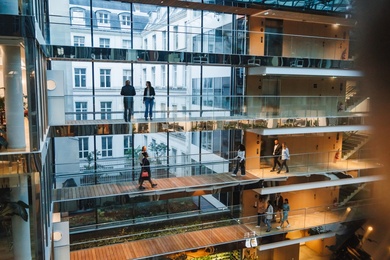Three reasons why sustainability supports SME growth

[caption id="attachment_4228" align="alignleft" width="433"] Investing in SME sustainability pays off[/caption]
Investing in SME sustainability pays off[/caption]
- Sustainability is salvation
That's what the Harvard Business Review concluded in 2009 following the subprime crisis, a conclusion repeated last year by Andrew Winston—the author of The Big Pivot—in the same publication. According to Winston, the only way to stop global warming and keep it from affecting productivity and increasing commodity costs is by lining up the private sector behind the goal of reducing greenhouse gas emissions by at least 5% annually.
This is vital for SMEs, since their profit margins are not always as high and small imbalances can affect their stability and development. The challenge is detecting where the energy and basic resources are being wasted, and doing so in time.
For example, Emerson Network Power found out that their IT servers account for 52% of their total power consumption, while 38% is consumed by precision air conditioning. In these cases, small changes like replacing the servers that are more than six years old—since they consume up to 64% of the power yet do only 4% of the work—with newer and more compact ones is a change that can result in savings. It is also important to replace air conditioning with a free-cooling system, which takes advantage of exterior air temperatures to reduce electricity costs.
- Consumers want green
A poll done by Nielsen in 2014 of more than 30,000 people found that 63% of Latin Americans are willing to pay more for goods and services delivered by companies with better corporate social responsibility.
This is added value that for SMEs could make the difference in a customer's decision to buy, whether that customer is an individual or a business. While it might be costly for a small restaurant to invest in a full-fledged corporate social responsibility program as many large multinationals do, something as simple as sourcing organic ingredients locally and paying farmers a fair price could provide a selling point vis-à-vis the right clientele.
Today, projects like the Walmart Sustainability Index put the spotlight on companies that are truly focused on being more environmentally friendly. In addition to companies in the U.S., the index covers Chile and five other countries. This bolsters the images of these businesses and adds value to their brands, which can help open doors to working with larger companies. IBM is one example, as it requires its suppliers in Latin America and elsewhere to have systems in place for environmental management and corporate social responsibility.
- SMEs committed to sustainability are more creditworthy
A study done by HealRWorld found that SMEs committed to sustainability are more durable than average. A total of 21% of active businesses in the United States are categorized as higher risk. In comparison, this is true of only 3% of sustainable businesses in the same category. According to the CEO of HealRWorld, the study demonstrated a strong correlation between SME commitment to sustainability and having a good credit profile.
That’s why business owners who invest in SME sustainability are able to increase the social and environmental value of their businesses and compete with larger enterprises, and why the IIC offers initiatives like Sustainability Week, a training event with more than 400 participants from 180 financial institutions from all over Latin America and the Caribbean that's been held annually since 1999. The idea is to encourage financial institutions to advocate for the sustainability of the SMEs in which they invest. This year, the event will take place in Asunción, Paraguay, on October 5-9.
¿TE GUSTA LO QUE ACABAS DE LEER?
Suscríbase a nuestra newsletter para mantenerse informado sobre las últimas noticias de BID Invest, publicaciones de blog, próximos eventos y para obtener más información sobre áreas específicas de interés.
Suscribirse



